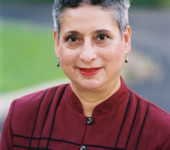• by Frances M. Guzmán, M.Ed. • IDRA Newsletter • October 2003


While many of the attendees were professionals who have labored in the field of gender equity for many years to protect and extend civil rights and nondiscrimination for children in public schools, many of the attendees were also new to this important area of equity.
The mission of the AGELE is to provide leadership in identifying and infusing gender equity in all educational programs and processes and within parallel equity concerns, including, but not limited to, age, disability, ethnicity, national origin, race, religion, sexual orientation and socio-economic status.
This year’s conference theme captured this mission perfectly: “Gender Equity Leadership and Advocacy in Education: Local, State, and National Perspectives.” It provided participants with a hands-on opportunity to interact with presenters, keynote speakers, and the general organizational membership about transforming and emerging issues regarding gender equity that clearly provide challenges and opportunities as the nation’s public schools implement the No Child Left Behind Act.
Dr. Nora Ibanez Hancock, associate commissioner of the Texas Education Agency (TEA) set the tone for the entire conference in her opening presentation. She traced the origins of Title IX as a basis for explaining the impact this law had on her own personal life. In describing her story of being a young Latina who, with her parents’ support, pursued non-traditional courses in her public school in south Texas, she also created a compelling context for the conference participants to examine many gender equity issues.
Dr. Hancock’s challenge to the group was simple and direct. She said that shortchanging a student because of his or her gender is trite, outdated, and not appropriate in an era of high achievement. The leadership must work pro-actively to eradicate old stereotypes, shape the 21st century action agenda, and move schools, communities, and the girls they serve to a new level of excellence.
Dr. Bradley Scott, director of the SCCE at IDRA, presented a description of how certain barriers remain to block access for girls from the very goals that must be achieved in schools. The psychological, social, emotional, and political boundaries that block opportunities for inclusion, access, appropriate treatment and supports for learning still challenge education leadership to seek new and more powerful strategies for change in institutional practices concerning issues related to gender.
Dr. Scott provided a framework for action and change regarding gender equity that challenged participants to lift girls and boys to a higher place. He also captured that compelling challenge in a song he wrote and presented as a closure to his presentation.
More than 30 sessions during the course of the conference presented a wide range of topics from gender programs that work, to an examination of a gender inclusive leadership theory. Dealing with issues of terror, bullying, harassment, athletics, women’s history, the gendered nature of technology, research on giving voice to Latinas, gender and disabilities, and school-home partnerships to support gender equity all received balanced and appropriate attention during the course of the conference.
Finally, in anticipation of the 50th anniversary celebration of the Brown vs. Board of Education Supreme Court decision that desegregated the nation’s public schools in 1954, a special session was presented by Ms. Joyce Harris, director of the Equity Center at the Northwest Region Educational Laboratory (NWREL) that focused on the women of Brown.
Two AGELE awards were presented for promoting sex equity in education and for the member who has made an outstanding contribution to the field of gender equity in education. Ms. Barbara Bitter received the Barb Landers Memorial Fund Award for her work in public schools. Dr. Percy Bates, director of Programs for Educational Opportunity, the equity assistance center at the University of Michigan, Ann Arbor received the Shirley McCune Award for his outstanding work on the national Title IX Commission on Athletics in Colleges and Universities.
Congratulations AGELE for a wonderful, exciting, and dynamic conference. See you next year in Washington, D.C.
Frances M. Guzmán, M.Ed., is an education associate in the IDRA Division of Professional Development. Comments and questions may be directed to her via e-mail at feedback@idra.org.
[©2003, IDRA. This article originally appeared in the October 2003 IDRA Newsletter by the Intercultural Development Research Association. Permission to reproduce this article is granted provided the article is reprinted in its entirety and proper credit is given to IDRA and the author.]


